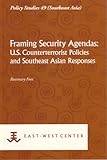Framing Security Agendas : U.S. Counterterrorist Policies and Southeast Asian Responses / Rosemary Foot.
Material type: TextPublisher: Singapore : ISEAS Publishing, [2008]Copyright date: ©2008Description: 1 online resource (71 p.)Content type:
TextPublisher: Singapore : ISEAS Publishing, [2008]Copyright date: ©2008Description: 1 online resource (71 p.)Content type: - 9789812308665
- 9789812308672
- 363.320959 22
- HV6431 .F665 2008
- online - DeGruyter
| Item type | Current library | Call number | URL | Status | Notes | Barcode | |
|---|---|---|---|---|---|---|---|
 eBook
eBook
|
Biblioteca "Angelicum" Pont. Univ. S.Tommaso d'Aquino Nuvola online | online - DeGruyter (Browse shelf(Opens below)) | Online access | Not for loan (Accesso limitato) | Accesso per gli utenti autorizzati / Access for authorized users | (dgr)9789812308672 |
Browsing Biblioteca "Angelicum" Pont. Univ. S.Tommaso d'Aquino shelves, Shelving location: Nuvola online Close shelf browser (Hides shelf browser)

|

|

|

|

|

|

|
||
| online - DeGruyter Connecting and Distancing : Southeast Asia and China / | online - DeGruyter ASEAN-U.S. Symposium / | online - DeGruyter Supporting Peace in Aceh : Development Agencies and International Involvement / | online - DeGruyter Framing Security Agendas : U.S. Counterterrorist Policies and Southeast Asian Responses / | online - DeGruyter Attitudes and Awareness Towards ASEAN : Findings of a Ten-Nation Survey / | online - DeGruyter Building on ASEAN's Success : Towards an Asia Pacific Community / | online - DeGruyter Nahdlatul Ulama and the Struggle for Power within Islam and Politics in Indonesia / |
Frontmatter -- Contents -- List of Acronyms -- Executive Summary -- Introduction -- Endnotes -- Bibliography
restricted access online access with authorization star
http://purl.org/coar/access_right/c_16ec
What has it meant to be labeled the "second-front" in the "global war on terror"? Have Southeast Asian states accepted that the primary threat their countries face is Al-Qaeda-inspired terrorist violence, or are other security concerns deemed more pressing? This study investigates threat perceptions in four Southeast Asian countries: Indonesia, Malaysia, the Philippines, and Singapore. It probes the extent to which their security concerns align with those of Washington, together with their preferred means for dealing with the phenomenon of terrorist violence. The central findings are that, in all four countries, the U.S. counterterrorist security agenda has shaped security perceptions as well as security behavior, though to a greater extent in the Philippines and Singapore than in Indonesia and Malaysia. However, the most important effect in Southeast Asia of this change in the U.S. security priority after 9/11 has been sociopolitical in nature, even where an individual government might not perceive the threat from terrorism to be the major security challenge that it faces. In each of the four states, involvement in the U.S. decision to give overwhelming attention to counterterrorist action has sharpened the focus on long-standing security concerns, especially those connected with the security of the political regime or unity of society. In sum, these countries' domestic concerns interact in complex and subtle ways with their security relationship with the United States, as well as affecting the methods that the individual governments have used to deal with actual or potential terrorist violence inside their countries.
Mode of access: Internet via World Wide Web.
In English.
Description based on online resource; title from PDF title page (publisher's Web site, viewed 01. Dez 2022)


